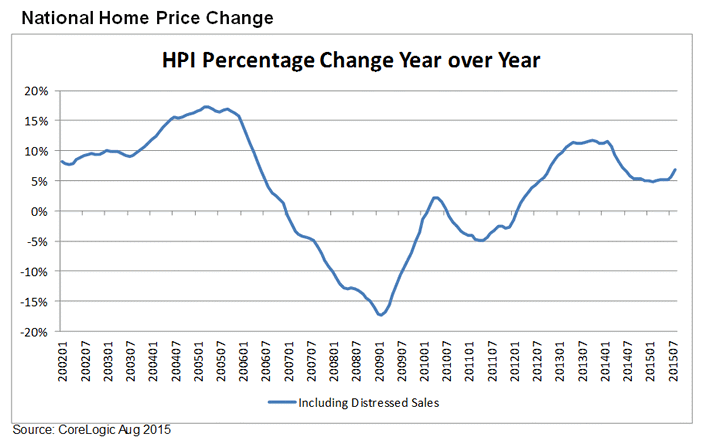CoreLogic said on Tuesday that its Home Price Index (HPI) including distressed sales rose on a year-over-basis for the 42nd consecutive month in August. The HPI was up 6.9 percent compared to August 2014, the second month in a row that the annual increase was at that level. The index was up 1.2 percent compared to July.

As we noted last month, the differential between CoreLogic's two HPIs, one including and one excluding distressed property sales had narrowed to the point of being negligible. The company has apparently discontinued the public reporting of the latter index.
Two states posted double digit annual price increases. In Colorado the HPI rose 10.4 percent and in Washington it was up 10.3 percent. The third largest increase, 9.3 percent, was in Nevada followed by Oregon at 9.1 percent and New York at 8.6 percent. The only state to post a negative number was Mississippi where prices declined 0.9 percent on an annual basis.
The CoreLogic HPI Forecast indicates that home prices are projected to increase by 4.3 percent on a year-over-year basis from August 2015 to August 2016 and remain unchanged month over month from August 2015 to September 2015. The CoreLogic HPI Forecast is a projection of home prices using the CoreLogic HPI and other economic variables. Values are derived from state-level forecasts by weighting indices according to the number of owner-occupied households for each state. In October 2014 CoreLogic's forward looking HPI predicted an annual increase in August 2015 of 5.2 percent.
"Economic forecasts generally project higher mortgage rates and more single-family housing starts for 2016. These forces should dampen demand and augment supply, leading to a moderation in home price growth," said Frank Nothaft, chief economist for CoreLogic. "Over the next 12 months through August 2016, CoreLogic projects its national HPI to rise 4.3 percent, less than the 6.9 percent gain over the 12 months through August 2015."
"Home price appreciation in cities like New York, Los Angeles, Dallas, Atlanta and San Francisco remain very strong reflecting higher demand and constrained supplies," said Anand Nallathambi, president and CEO of CoreLogic. "Continued gains in employment, wage growth and historically low mortgage rates are bolstering home sales and home price gains. In addition, an increasing number of major metropolitan areas are experiencing ever-more severe shortfalls in affordable housing due to supply constraints and higher rental costs. These factors will likely support continued home price appreciation in 2016 and possibly beyond."







